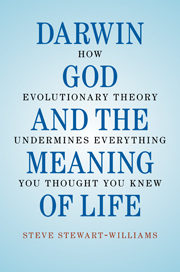 Darwin, God and the Meaning of Life
Darwin, God and the Meaning of Life Book contents
- Frontmatter
- Contents
- Acknowledgments
- 1 Darwin and the big questions
- Part I Darwin gets religion
- Part II Life after Darwin
- 8 Human beings and their place in the universe
- 9 The status of human beings among the animals
- 10 Meaning of life, RIP?
- Part III Morality stripped of superstition
- Suggestions for further reading
- References
- Index
9 - The status of human beings among the animals
Published online by Cambridge University Press: 05 June 2012
- Frontmatter
- Contents
- Acknowledgments
- 1 Darwin and the big questions
- Part I Darwin gets religion
- Part II Life after Darwin
- 8 Human beings and their place in the universe
- 9 The status of human beings among the animals
- 10 Meaning of life, RIP?
- Part III Morality stripped of superstition
- Suggestions for further reading
- References
- Index
Summary
God's noblest work? Man. Who found it out? Man.
Mark Twain (1992), p. 943Man in his arrogance thinks himself a great work worthy of the interposition of a deity. More humble and I think truer to consider him created from animals.
Charles Darwin, cited in Barrett et al. (1987), pp. 196–7Again and again, we encounter sweeping visions, encompassing everything from the primordial dust cloud to the chimpanzee. Then, at the very threshold of a comprehensive system, traditional pride and prejudice intervene to secure an exceptional status for one peculiar primate … The specific form of the argument varies, but its intent is ever the same – to separate man from nature.
Stephen Jay Gould (1980), p. 136King of the earth
If I were to ask you which plant is superior to all other plants – which is the noblest and most worthy of plants – you'd probably be hard pressed to think of an answer. In fact, you'd probably think the question was decidedly odd. If, on the other hand, I were to ask you which animal is superior to all other animals, the noblest and most worthy, this would seem like a perfectly reasonable question. And I can guess what your answer would be. It seems an unshakeable conviction of the greater part of humankind that our species is superior to all others. Shakespeare's Hamlet expressed this view in the following famous words:
What a piece of work is a man! How noble in reason! How infinite in faculty! In form and moving how express and admirable! In action how like an angel! In apprehension how like a god! The beauty of the world! The paragon of animals!
(Hamlet, Act ii, Scene ii)- Type
- Chapter
- Information
- Darwin, God and the Meaning of LifeHow Evolutionary Theory Undermines Everything You Thought You Knew, pp. 162 - 187Publisher: Cambridge University PressPrint publication year: 2010


